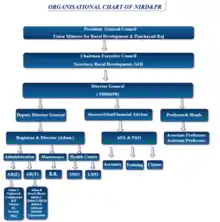National Institute of Rural Development
The National Institute of Rural Development and Panchayati Raj (NIRD&PR), an autonomous organisation under the Union Ministry of Rural Development, is a premier national centre of excellence in rural development and Panchayati Raj. Recognized internationally as one of the UN-ESCAP Centres of Excellence, it builds capacities of rural development functionaries, elected representatives of PRIs, bankers, NGOs and other stakeholders through inter-related activities of training, research and consultancy. The Institute is located in Hyderabad, Telangana. The NIRD&PR celebrated its Golden Jubilee Year of establishment in 2008. In addition to the main campus at Hyderabad, this Institute has North-Eastern Regional Centre at Guwahati, Assam to meet the NE-regional needs.[1]
Overview
Vision
The vision of NIRD&PR is to focus on the policies and programmes that benefit the rural poor, strive to energise the democratic decentralization processes, improve the operation and efficiency of rural development personnel, promote transfer of technology through its social laboratories, Technology Park and create environmental awareness. As a “think-tank” for the Ministry of Rural Development, NIRD while acting as a repository of knowledge on rural development would assist the Ministry in policy formulation and choice of options in rural development to usher in the changes.
Mission
To examine and analyse the factors contributing to the improvement of economic and social well-being of people in rural areas on a sustainable basis with focus on the rural poor and the other disadvantaged groups through research, action research, consultancy and documentation efforts.
To facilitate the rural development efforts with particular emphasis and focus on the rural poor by improving the knowledge, skills and attitudes of rural development officials and non-officials through organising training, workshops and Seminars.
Objectives
The NIRD&PR is mandated to:
- Organise training programmes, conferences, seminars and workshops for senior level development managers, elected representatives, bankers, NGOs and other stakeholders;
- Undertake, aid, promote and coordinate research on its own and / or collaborate with State, national and international development agencies;
- Analyse and offer solutions to problems encountered in planning and implementation of the programmes for rural development, decentralised governance, panchayati raj and related programmes;
- Study the functioning of the Panchayati Raj Institutions (PRIs) and rural development programmes across the States;
- Analyse and propose solutions to problems in planning and implementation of the programmes for rural development; and
- Develop content and disseminate information and transfer technology through periodicals, reports, e-modules and other publications.
History
In the early fifties, Community Development Blocks were set up in the country to promote social and economic development of villages. The Central Institute of Study and Research in Community Development was conceived and set up in 1958 at Mussoorie for offering orientation courses to officers of executive hierarchy in the development programmes. The Trainers' Training Institute (subsequently renamed as the Institute for Instruction in Community Development), established in December, 1958 at Rajpur, Dehradun was entrusted with the task of training of District Panchayat Officers and sub-divisional officers and trainers of state institutions. In April 1962, both the Institutes were merged into one named as National Institute of Community Development (NICD). NICD was shifted to Hyderabad campus during 1964-65. The Institute was changed in to registered society under the Public Services Registration Act No.1 of 1350 Fasli (No.229 of 1965). As per decision taken by General Council in its meeting held on 20.9.1977, the Institute was renamed and registered as National Institute of Rural Development (NIRD). Recognizing the need for more focus on strengthening Panchayati Raj system and capacity building of PRI functionaries through the network of SIRDs and ETCs, the name of NIRD has been changed as National Institute of Rural Development & Panchayati Raj (NIRD&PR) in the year 2014.[2]
Organogram

NIRDPR- NERC
The North Eastern Regional Centre of the National Institute of Rural Development & Panchayati Raj (NIRD & PR-NERC) came into existence in July 1983 at Guwahati with the aim to orient its training and research activities to the specific needs and potentials of North Eastern States. The Centre is located at Jawaharnagar, Khanapara, adjacent to Assam Administrative Staff College and Veterinary College, Assam Agriculture University, Khanapara. It is at a distance of about 15 km from Guwahati Railway Station and Central ASTC Bus Stand and nearly 35 kms from Lokpriya Gopinath Bordoloi International Airport.[3]
PG courses
Aim & Strategy
To develop a committed and competent cadre of Rural Development Management Professionals in the country. Offer a range of courses that addresses key policy and management issues in rural development. Provide students with core development and management insights and impart analytical skills for planning and managing Rural Development Programmes. Develop students' capacities and infuse right attitudes, values and ethics.
Objectives
On completion of the Programme, the students will have developed:
- Expertise in planning and management of rural development programmes with focus on participatory development and innovation
- Competence in reorienting the development delivery systems for improved delivery of services
- Sensitivity to the issues of equity and gender
- Appreciation of the rights and entitlements of the rural poor and the socially disadvantaged groups
- Right attitudes and values necessary for rural development professionals
- Positive thinking and leadership qualities.
Programme Design
The PGDRDM design rests on the tripod of (i) Rural Development Philosophy, Concepts, Principles, Policies, Programmes and Organisations (ii) Rural Development Management Practices, and (iii) Rural Social Sector. The Programme consists of three major components, namely, (a) Classroom teaching and interactive learning (b) Fieldwork (short visits and long visit) and (c) Field Attachment (Rural Organisational Internship). The first Component envisages exposure to attitudes, skills and knowledge relevant to the rural society, rural development philosophy and concepts, and rural development management theories and practices. The second one primarily revolves around understanding the rural society, its people, dynamics of interaction, institutions, relationships and livelihoods by way of intensive fieldwork. The last Component seeks to equip the students with skills of managing organisations/enterprises through organisational internship for 'hands on learning and applications'.
Programme Duration : One year - Three Trimesters